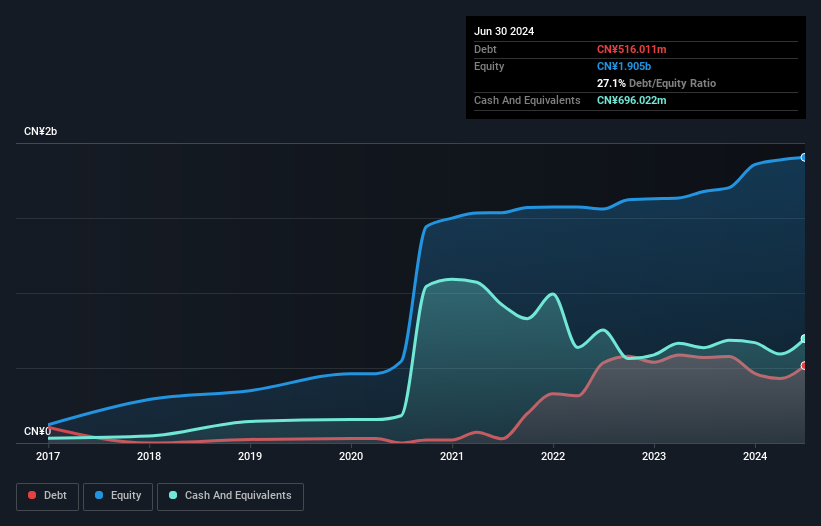We Think Shenzhen Honor Electronic (SZSE:300870) Can Stay On Top Of Its Debt
Howard Marks put it nicely when he said that, rather than worrying about share price volatility, 'The possibility of permanent loss is the risk I worry about... and every practical investor I know worries about.' It's only natural to consider a company's balance sheet when you examine how risky it is, since debt is often involved when a business collapses. We note that Shenzhen Honor Electronic Co., Ltd. (SZSE:300870) does have debt on its balance sheet. But should shareholders be worried about its use of debt?
When Is Debt Dangerous?
Generally speaking, debt only becomes a real problem when a company can't easily pay it off, either by raising capital or with its own cash flow. Part and parcel of capitalism is the process of 'creative destruction' where failed businesses are mercilessly liquidated by their bankers. While that is not too common, we often do see indebted companies permanently diluting shareholders because lenders force them to raise capital at a distressed price. Of course, debt can be an important tool in businesses, particularly capital heavy businesses. When we think about a company's use of debt, we first look at cash and debt together.
View our latest analysis for Shenzhen Honor Electronic
What Is Shenzhen Honor Electronic's Net Debt?
You can click the graphic below for the historical numbers, but it shows that Shenzhen Honor Electronic had CN¥516.0m of debt in June 2024, down from CN¥570.4m, one year before. But it also has CN¥696.0m in cash to offset that, meaning it has CN¥180.0m net cash.

How Healthy Is Shenzhen Honor Electronic's Balance Sheet?
The latest balance sheet data shows that Shenzhen Honor Electronic had liabilities of CN¥1.95b due within a year, and liabilities of CN¥295.3m falling due after that. Offsetting these obligations, it had cash of CN¥696.0m as well as receivables valued at CN¥1.35b due within 12 months. So its liabilities outweigh the sum of its cash and (near-term) receivables by CN¥204.5m.
Since publicly traded Shenzhen Honor Electronic shares are worth a total of CN¥5.53b, it seems unlikely that this level of liabilities would be a major threat. But there are sufficient liabilities that we would certainly recommend shareholders continue to monitor the balance sheet, going forward. While it does have liabilities worth noting, Shenzhen Honor Electronic also has more cash than debt, so we're pretty confident it can manage its debt safely.
In addition to that, we're happy to report that Shenzhen Honor Electronic has boosted its EBIT by 88%, thus reducing the spectre of future debt repayments. There's no doubt that we learn most about debt from the balance sheet. But ultimately the future profitability of the business will decide if Shenzhen Honor Electronic can strengthen its balance sheet over time. So if you're focused on the future you can check out this free report showing analyst profit forecasts.
Finally, a business needs free cash flow to pay off debt; accounting profits just don't cut it. While Shenzhen Honor Electronic has net cash on its balance sheet, it's still worth taking a look at its ability to convert earnings before interest and tax (EBIT) to free cash flow, to help us understand how quickly it is building (or eroding) that cash balance. During the last three years, Shenzhen Honor Electronic burned a lot of cash. While that may be a result of expenditure for growth, it does make the debt far more risky.
Summing Up
We could understand if investors are concerned about Shenzhen Honor Electronic's liabilities, but we can be reassured by the fact it has has net cash of CN¥180.0m. And it impressed us with its EBIT growth of 88% over the last year. So we don't have any problem with Shenzhen Honor Electronic's use of debt. When analysing debt levels, the balance sheet is the obvious place to start. But ultimately, every company can contain risks that exist outside of the balance sheet. Case in point: We've spotted 1 warning sign for Shenzhen Honor Electronic you should be aware of.
At the end of the day, it's often better to focus on companies that are free from net debt. You can access our special list of such companies (all with a track record of profit growth). It's free.
Have feedback on this article? Concerned about the content? Get in touch with us directly. Alternatively, email editorial-team (at) simplywallst.com.
This article by Simply Wall St is general in nature. We provide commentary based on historical data and analyst forecasts only using an unbiased methodology and our articles are not intended to be financial advice. It does not constitute a recommendation to buy or sell any stock, and does not take account of your objectives, or your financial situation. We aim to bring you long-term focused analysis driven by fundamental data. Note that our analysis may not factor in the latest price-sensitive company announcements or qualitative material. Simply Wall St has no position in any stocks mentioned.
 Index Options
Index Options CME Group
CME Group Nasdaq
Nasdaq Cboe
Cboe TradingView
TradingView Wall Street Journal
Wall Street Journal